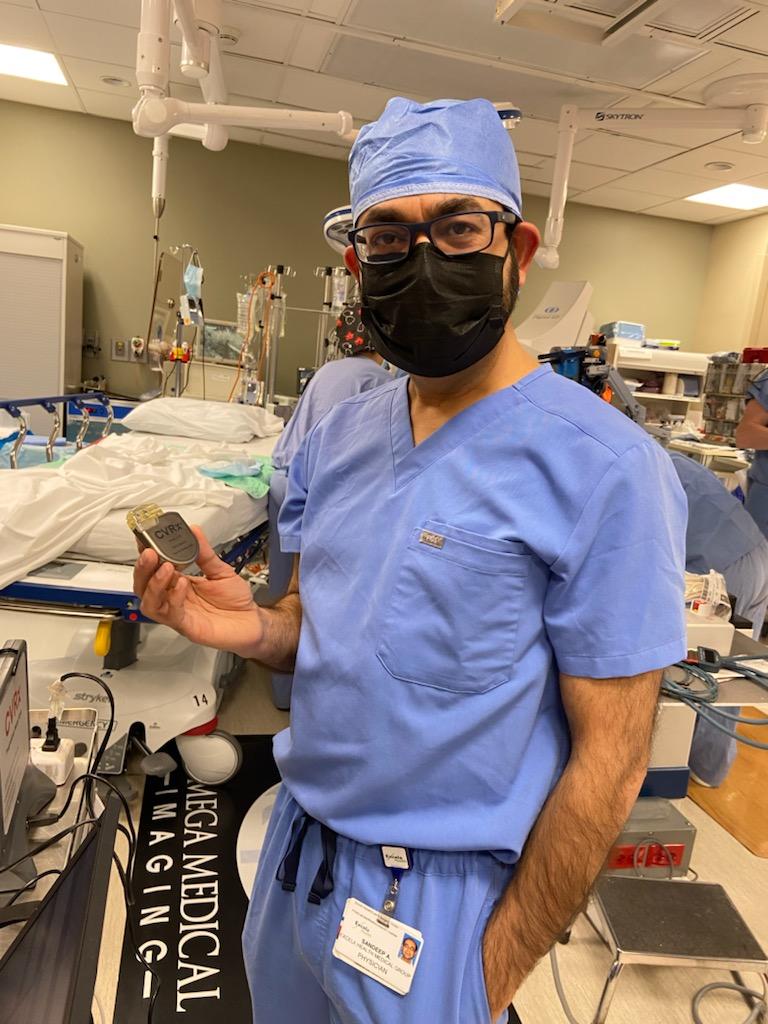Excela Health First In Pennsylvania To Deploy Implantable Device For Heart Failure Treatment
- Category: Media Release, Cardiovascular Care
- Posted On:


GREENSBURG, PA, November 2021 … Excela Health continues to advance cardiovascular care in the region as the first health system in Pennsylvania to offer a new procedure that improves the symptoms of patients with systolic heart failure. Electrophysiologists and Vascular Surgeons in The Heart Center at Excela Health Westmoreland Hospital announced their first successful implantation of Barostim™Baroreflex Activation Therapy this week. The implantable is the world’s first FDA-approved heart failure device to use neuromodulation -- the power of the brain and nervous system. This advanced, award-winning therapy was designed to treat heart failure patients who have had little to no success with other proven treatment options.
Excela's first patient is a 48-year-old male with previous history of coronary artery disease, myocardial infarction and chronic systolic heart failure. Following the Barostim procedure, his condition will continue to be medically managed with American Heart Association guideline directed medications and his previously implanted cardiac defibrillator based on his high risk for cardiac arrest. The patient will be seen at the Excela Health Heart Failure Clinic for follow-ups and device monitoring.
“Heart failure is a chronic, progressive condition in which the heart muscle is unable to pump enough blood to meet the body’s needs for blood and oxygen,” explained Excela Health cardiologist James Adisey, MD, medical director of Excela’s Heart, Lung and Vascular Institute. “Basically, the heart can’t keep up with its workload.”
Coronary artery disease is considered a primary cause of heart failure. Once the blood supply is reduced throughout the body, patients experience tiredness, shortness of breath, reduced physical activity and swelling of ankles and legs. The progression of the disease guides cardiologists in selecting the most appropriate treatment to reduce symptoms.
Barostim is delivered by the Barostim NEO™Generator, an implantable device that uses patented technology to send electrical pulses to baroreceptors located in the wall of the carotid artery. Baroreceptors trigger the body’s baroreflex, which, in turn, triggers an autonomic response to the heart. The therapy is designed to restore balance to the autonomic nervous system and thereby reduce the symptoms of heart failure.
Unlike other heart failure treatment options, Barostim does not touch the heart; instead, it utilizes an electrode that lies on the patient's carotid artery. The electrical impulses that are sent from the neuromodulation device inform the brain of the heart's condition, allowing the brain to improve the function of the heart. Over time, the organ will regain strength, with the symptoms of heart failure lessening, enabling patients to return to normal activity. This unique technology is customizable to meet each patient’s individual therapy needs and offers the potential to improve quality of life and reduce health risks associated with heart failure, including heart and kidney disease, stroke and death.
“As people age, they may erroneously believe that they must resign themselves to living with limited mobility and a reduced capacity to engage in the normal activities of daily living,” added Dr. Adisey. “This new technology gives us more options to reverse an otherwise debilitating condition.”
Barostim, created by Minneapolis-based medtech company CVRx®, was designated as a Breakthrough Device technology by the FDA, received FDA PMA Approval in 2019 and is now commercially available to reduce the symptoms of heart failure for patients who are not indicated for cardiac resynchronization therapy and have a left ventricular ejection fraction of 35% or less.
Barostim is also the recipient of the Centers for Medicare and Medicaid Services (CMS) Transitional Pass-Through Payment Status (TPT) and inpatient New Technology Add-On Payment (NTAP). The approval of TPT and NTAP for Barostim will help accelerate access to the therapy for the thousands of Medicare patients still suffering from the effects of heart failure.

